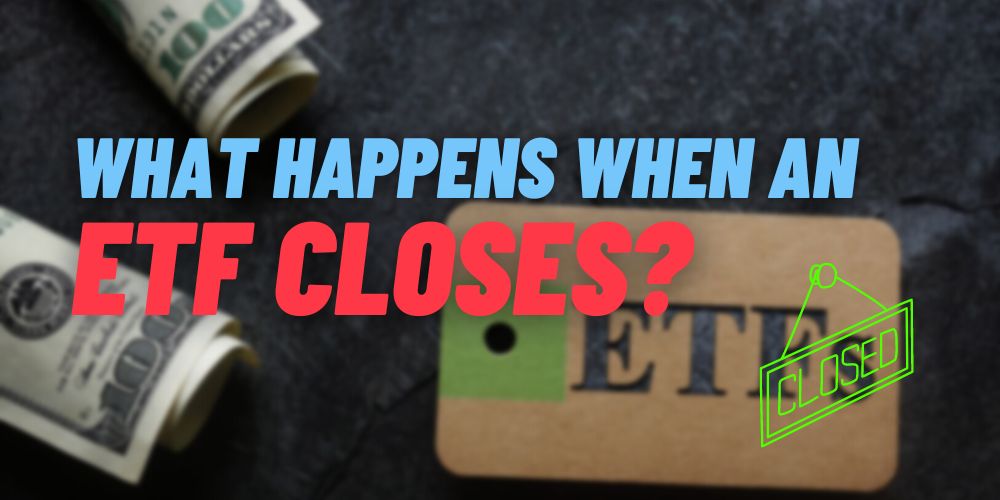An exchange-traded fund (ETF) is a type of investment company that pools money from investors and buys shares of stocks, bonds, or other securities.
But, what happens when an ETF Closes? To be precise, what happens to the money that was invested in it?
Read on to find out.
All About ETF Closures
ETFs are popular because they offer investors a simple way to invest in a wide range of assets. For example, an investor could buy an ETF that tracks the S&P 500 index, exposing them to the 500 largest companies in the US.
Additionally, ETFs are often used as a tool for active investors to hedge their portfolios or make short-term bets on the market.
While ETFs have many advantages, they also have some disadvantages. One major disadvantage is that ETFs can be subject to closures.
An ETF closure is not the same as bankruptcy, meaning investors do not lose their money because the fund was closed. Closures are relatively rare in the ETF industry, but they occur from time to time.
Exchange-traded funds differ from traditional mutual funds because they trade on an exchange, like stocks. So when an ETF decides to close its doors, it’s more like a company going out of business.
Investors will get back whatever is left in the fund’s portfolio after it pays off its debts and expenses. But they may not get all their money back right away.
It can take weeks or even months for the ETF to liquidate its assets and distribute the proceeds to shareholders. And in some cases, shareholders may only receive a fraction of what they invested.
What Happens When an ETF Closes?
When an ETF closes, it means that the fund will no longer trade on exchanges. An ETF often takes a few steps before permanently closing.
The first step is that the fund’s sponsor will issue a public notice of the impending closure.
This notice will include information on the closure date and the procedures used to liquidate the fund’s assets.
Once the ETF is closed, it will be delisted from any exchanges, and the fund’s assets will be sold off and distributed to shareholders according to their ownership stake in the fund.
If you’re holding shares of an ETF that is scheduled to close, you’ll need to take action before the closure date to avoid losing your investment. Many investors choose to sell their shares on the open market before the closure date.
However, you may also be able to redeem your shares directly with the fund sponsor. Shareholders will typically receive a cash payout equal to the net asset value of their shares.
While closures can be inconvenient for investors, they are usually very orderly and transparent. The ETF issuer will typically announce a closure well in advance, giving investors plenty of time to make alternative arrangements.
Why Do ETF Closures Happen?

The first thing to understand is that an exchange-traded fund closure is usually not permanent. In most cases, an ETF will be closed for a short period of time to make changes or adjustments.
For example, an ETF might be closed to rebalance its holdings or to change its structure. Once the changes have been made, the ETF will typically reopen for business.
There are a few reasons why an ETF might be permanently closed. The most common reason is poor performance.
If an ETF is consistently underperforming its benchmarks or other similar investment products, it will eventually be shut down.
Additionally, ETF closures can be triggered by several factors, including low trading volume, lack of investor interest, or changes in the underlying index that the ETF tracks.
Regardless of the reason, ETF closures can have a major impact on investors.
What Are the Downsides of ETF Closures?
ETF closures are a big deal because they can affect your investment portfolio in a number of ways.
If you own shares of an ETF that’s about to close, you’ll need to take action to avoid being stuck with worthless shares.
You’ll need to sell your shares and find another place to invest your money. This can be a hassle, and finding another ETF that meets your investment needs is not always easy.
You can check with your broker to see if they offer any options for handling ETF closures. Some brokers may allow you to sell your shares before the ETF closes, while others may require you to hold onto the shares until the distribution date.
If you don’t have a broker that offers options for dealing with ETF closures, you’ll need to sell your shares on the open market.
This can be tricky, as there may not be many buyers interested in purchasing shares of a closing ETF. As a result, you may have to sell your shares at a significant discount.
ETF closures can also impact your taxes and be held in a taxable account. If you receive cash from an ETF closure, it will be considered a capital gain and will be subject to capital gains taxes.
If you receive stocks in return for your ETF shares, you’ll need to pay taxes on the difference between the stock’s market value and your cost basis (the price you paid for the shares).
How To Avoid ETF Closures?
Avoiding an ETF closure comes down to making smart investment choices. By researching and investing in quality ETFs, you can help protect yourself from the risk of closure.
Here are four things to look for:
- Provider: Search for ETFs that large and well-known providers support. These providers are more likely to have the resources to keep the ETF running even if it isn’t doing well in the short term.
- Rating: Search for ETFs with high ratings from independent rating agencies. You can also review their financial analysis and investment advice. The rating agencies use performance, management, and history to assess ETFs.
- Trading volume: Ensure the ETF you’re considering has enough trading volume. An ETF with low trading volume may be harder to sell when needed. A good rule of thumb is to look for an ETF with an average trading volume of at least $10 million.
- Broad appeal: Choose ETFs with a broad investment strategy, like S&P 500 index funds. These types of ETFs are more popular with investors and less likely to be closed down.
Final Thoughts
ETF closure occurs when an ETF can no longer track its underlying index or asset.
This can happen for various reasons, such as changes in the composition of the underlying index or asset or the negative performance of the ETF.
When an ETF closure occurs, investors typically have two options: sell their shares on the open market or hold onto them and hope that the ETF will eventually resume tracking its underlying index or asset.
As with any investment, there are risks involved in owning an ETF. However, if you do your research and invest wisely, an ETF can be a great addition to your portfolio.


 Tags:
Tags:










